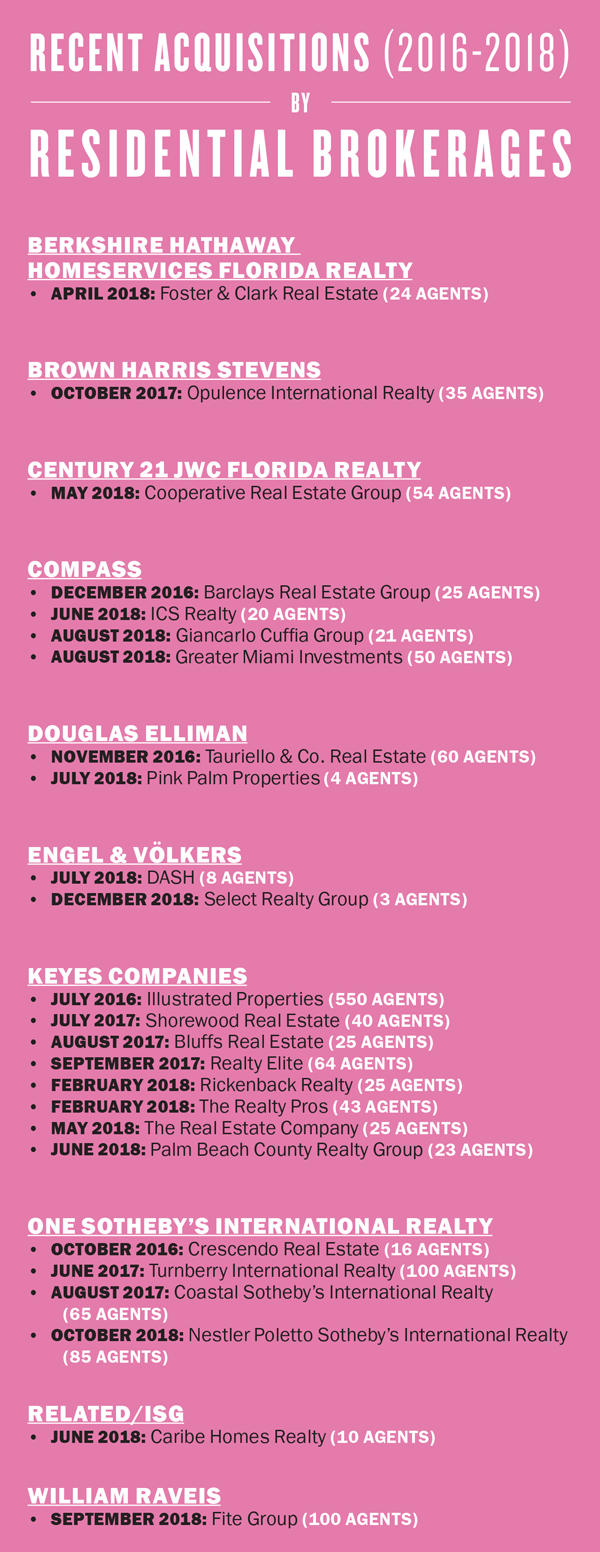About every six months, Gary Hennes gets a call he’s come to expect. The owner of Gary Hennes Realtors said he has been approached to sell his brokerage at a regular interval over the last few years, but believes he “may never” get the right deal that will lead him to finally do so.
In a climate of increased merger and acquisition activity — what some have characterized as frenzied — Hennes, who opened the doors to his firm more than 12 years ago, said the increased consolidation in the industry benefits him “because [the bigger firms] all look so similar now.”
Over the last few months, more and more broker-owners are giving way to larger companies, handing over the keys — and overhead costs — to their businesses.
Becoming part of a large firm has a growing allure to brokers who are looking to take a step back from their businesses and to some of their agents, who may want access to the resources only a bigger company can provide. Hennes, whose firm has over 60 agents — most of whom have been with the company for a number of years — compared boasting a large number of brokers to being “the new Louis Vuitton.”
“Now it’s just a survival of the fittest of these offices trying to get bodies and numbers,” Hennes said. He’s part of a shrinking segment of the residential brokerage scene in South Florida: independent companies with no affiliation to a larger brand.
The de la Vega family’s One Sotheby’s International Realty — the dominating franchise of the brand in South Florida, with 900 agents — snapped up Nestler Poletto Sotheby’s International Realty, which was the sole remaining franchise in the region not under the One Sotheby’s umbrella. President Daniel de la Vega had been in talks with the 80-agent firm for about 10 months before closing the deal. “But it’s been on my mind for the last seven years,” de la Vega said.
The deal, which closed in October, gives One Sotheby’s control of the entire South Florida market for the brand, along with a brokerage that closed $235 million in sales volume in 2017.
The prestige that comes with having a large number of agents has changed the dynamic, especially in Miami Beach, Hennes said. The “bigger is better” attitude took root in 2015, according to the broker, when New York-based Brown Harris Stevens entered the Miami market with its acquisition of Zilbert International Realty and One Sotheby’s bought South Beach International Realty from Diane Lieberman.
The perception among brokers since then, Hennes said, has been that larger companies “provide more support, which everybody wants. But if you’re not productive and you’re not motivated, then it sort of cancels it out.”
The same goes for technology, industry insiders said. Compass may offer agents better technology, but are agents really using it?

“When you go up against corporate names, there’s a perception that corporate names are going to win out,” Hennes added. “That’s not true,” he said, citing the benefit of local experience. Hennes said that being a Realtor in Miami Beach for years before he started his own firm means he can effectively guide new agents.
Bells and whistles
Hennes isn’t the only independent operator who describes eschewing the advances of big firms hungry for an acquisition. Bill Hahne, founder of Miami Beach firm Hahne Real Estate, thinks he would lose agents if he joined a larger firm, adding that many of his employees came to him from such places. He said he’s been approached by one large company and offered a franchise from another, both of which he declined to name. For Hahne, the benefits of staying small outweigh what a big firm can serve up. He said he doesn’t charge transaction fees, which he disagrees with on principle, and offers agents more flexibility than a national brand. “I can’t offer certain bells and whistles that Coldwell Banker offers, but most agents don’t use all of them,” he added.
Luxury broker Dora Puig went independent in 2007 and hasn’t looked back since. She says she wouldn’t benefit from being with a bigger firm. “I already know how to navigate buyers and sellers,” she said.
Puig, ranked by Real Trends as the top agent in Miami-Dade for individual sales volume in 2018 with $245.1 million, compared clients using her firm, Luxe Living Realty, to high-end shoppers selecting their retailer of choice. “Some people like going to Saks and Neiman Marcus, and other people like to go to Hermès and Bottega Veneta,” she said. “I become an alternative for buyers and sellers that don’t want to deal with a huge company.”
She’s grown from a team of four to about 30: “I don’t want to pass 50.” Puig said she gets calls on a weekly basis from agents who want to join her firm.
The broker said she has been approached to sell to a larger company but has not considered it. “I’m still young enough to be in this business for a long time, and I’m not looking to retire,” she said. “We go faster, much faster. We’re leaner, greener. I don’t have to go to New York to get approval on my ads.”
Pressure overhead
Puig owns her offices, and she joked that she can rent out the commercial units if things go belly-up. But most brokerages aren’t so lucky, and managing to make a hefty rent payment and find office space when times are tough can sometimes push a broker to sell the company. It’s the thinning profit margins that are driving some smaller firms to put themselves up for sale.

Take, for example, the rumors swirling about Calibre International Realty. The 1,600-square-foot lease for its headquarters at 1674 Meridian Avenue in Miami Beach is ending soon, broker and owner Julian Johnston said.
According to sources, he’s in talks to be acquired by New York City’s Corcoran Group, which currently operates two offices in Palm Beach County. Johnston, who declined to confirm whether he’s being acquired by Corcoran, said that “five years ago, I would have never moved” since at that time, national firms had a smaller local presence and such a move was unnecessary. The biggest downside to being absorbed by a larger firm, he said, is that you lose the autonomy to negotiate your own commissions.
Corcoran announced in October that it was expanding to Miami, but has not said when and where. Corcoran CEO Pam Liebman declined to comment on whether her firm is acquiring Calibre.
Johnston said his 25-agent firm closed about $140 million in sales volume this year. He cited thinning margins and the cost of management as reasons to join a larger company. He said he’s met with other brokerages over a cup of coffee to discuss a potential sale.
“The margins are so tight. Profitability is challenging. Every single [firm] is being approached or selling,” he claimed.
Flat-fee brokerages, like United Realty Group and EXp Realty, are also putting the pressure on smaller companies. EXp, a virtual brokerage where agents make deals online via avatars, has more than doubled in size since it was founded in 2009. In August, a spokesperson said the firm was on track to finish out the year with up to 20,000 agents. The brokerage doesn’t charge desk fees, royalty fees or franchise fees and lets agents keep between 80 percent to 100 percent of their commissions.
United Realty, a Plantation-based brokerage with only a handful of full-time employees, doesn’t charge its agents desk or franchise fees, instead offering a 100 percent commission with a $299 transaction fee. The brokerage had a net gain of 401 agents between June 2017 and October 2018, according to an analysis by The Real Deal (see the full story on page 22.)
Even Hahne, who doesn’t see the value of working for a bigger firm, is realistic about the possibility of selling to a larger company given the new payment structures that companies like EXp and United Realty are offering. “Compensation will continue to get more competitive,” he said. “So far, I’ve been able to hold on. We’ll see what happens as I roll into 2019.”
 In many cases, acquisitions of smaller firms are low-key affairs, with three-to-five-agent brokerages becoming part of a larger firm that takes over the overhead and management, while the former broker-owner goes back to selling without the worry of running the business. Howard Lorber, chairman of Douglas Elliman, said at TRD’s South Florida Real Estate Showcase & Forum in October that the New York brokerage doesn’t really do many acquisitions, with the exception of its purchase of Beverly Hills-based Teles Properties. “All the other acquisitions were smaller companies that just folded into us,” he said. “Most of those companies that came in and joined us, they didn’t have a big market share.”
In many cases, acquisitions of smaller firms are low-key affairs, with three-to-five-agent brokerages becoming part of a larger firm that takes over the overhead and management, while the former broker-owner goes back to selling without the worry of running the business. Howard Lorber, chairman of Douglas Elliman, said at TRD’s South Florida Real Estate Showcase & Forum in October that the New York brokerage doesn’t really do many acquisitions, with the exception of its purchase of Beverly Hills-based Teles Properties. “All the other acquisitions were smaller companies that just folded into us,” he said. “Most of those companies that came in and joined us, they didn’t have a big market share.”
Timing is everything
What leads a company to sell depends on a handful of factors, according to Mike Pappas, president and CEO of the Keyes Company: It all comes down to the right combination of a broker’s age, advances in technology and tightening profit margins. The rent, after all, is due every month, and payroll every two weeks.
Pappas takes the patient approach to the firms he wants to snap up. “We historically have been in contact with most firms for a number of years,” he said, adding that he was in talks with the owner of Rickenback Realty for 20 years before closing on it in February.
But Pappas acknowledged that it takes “some finesse” to get all the agents on board, especially when it comes to commission splits.
Craig Studnicky, principal of International Sales Group and president of Related-
ISG, said his firm isn’t actively looking to pick up any smaller brokerages. And while the big acquisitions by other firms do create opportunities to attract top agents who might be fleeing their new firms, he doesn’t go poaching. He prefers to let them come to him if they’re interested.
“If you’re a seasoned agent, you’re used to doing things your way,” Studnicky said. “These organizations require you to do it their way … Real estate agents just don’t like being told what to do and how to do it.”
